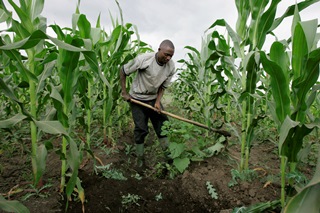Kiir directs state governors to declare war on poverty through agriculture
August 19, 2013 (JUBA) – South Sudan president Salva Kiir Mayardit has urged state governors to declare war on poverty by engaging in a massive sensitization campaign to encourage citizens to return to the land.

“We must start winning the war against poverty. We have resources. There is land with alluvial soil, very much fertile. Our land does not require fertilisers. It just needs the labour”, Kiir said on Sunday.
Community representatives attending the meeting had gathered at his residence to congratulate the president on the recent restructuring of the national cabinet, as well as the subsequent appointment of his new ministers.
Kiir said developing the agriculture sector was vital to pulling people out of poverty and reducing the county’s reliance on imports.
“I told governors recently to focus their activities on agriculture. They should sensitise the communities to cultivate [the land] so that we reduce dependence on imports from other countries. I told them to declare war on poverty as the biggest enemy to be fought”, he said.
Kiir acknowledged that expectations after independence remain high, however many people in South Sudan continued to struggle with difficult economis situations.
“Most of our youth face a lot of challenges. They do not have jobs; they don’t go to school”, Kiir said in a statement broadcast by the state-owned South Sudan Television (SSTV).
SUPPORT FOR PRESIDENTIAL BID
Meanwhile, women and youth representatives pledged to support Kiir as the incumbent president as he bids to secure electorate approval to stand for another term.
Speaking on behalf of community elders residing in Juba, Andrew Yak said they had come to offer their support to the president following the major cabinet reshuffle, as well as highlight important issues affecting the community.
“We also came to share with the president some of the issues which are facing us as a community, especially [the] lack of basic necessities like health services, schools, roads and support for agricultural projects in the area. The other issue we discussed with the president was our commitment to support him now as the president. We came to assure him we will always extend him our support as a community throughout his term and beyond”, said Yak.
Women’s representative Mary Deng also expressed gratitude to the president for according them the opportunity to discuss issues of concern.
“As women we came to congratulate our president for appointment of his cabinet and to assure our support to stand behind his decisions now and in the future. We are ready to stand anytime he wants our support”, said Deng.
She questioned why those in power did not put more efforts into developmental activities instead of engaging in politics about who should be the next president.
She said the immediate focus should be on the implementation of beneficial initiatives to progress the country now, rather than the 2015 elections.
She said speculation over who would be next presidential flag bearer was not only unhelpful, but detracted from other more pressing issues that needed attention in the country, adding that ultimately it is up to communities to decide if they want the president to stand for re-election.
“Why should people start talking about 2015? It is not even an issue. I guess people are doing it maybe because they don’t have anything to keep them busy. They should go out and explain the party’s policies and set up structures. There are areas in South Sudan where we don’t have good structures. These are all things that need to be put in place”, she said.
(ST)
